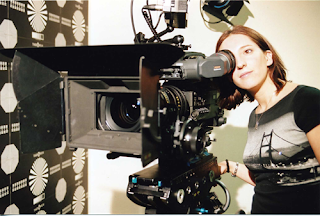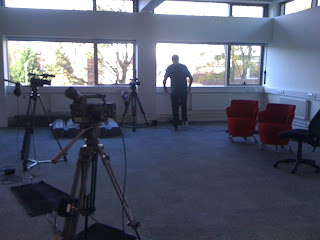Introduction
This assignment will involve descriptions of a variety of different studio roles, played within the film industry along with this it will consist of my most preferred studio role as a future career. This assignment will also draft a map of my actual skills and aptitude of the desired skills. Moreover, it will conclude with an action plan of the preferred job role in the future.
There are several roles played within the film industry these are listed below along with the brief description of each role.
Lighting Operator
This role is an important role when working in the film environment, this is because lighting is mostly used to give the best quality of the moving image and it also helps the other studio roles for example the camera operator to perform their job efficiently as when there is no lighting involved there is no good quality of image. In addition when more than one camera is in use at filming the lighting must appear at the same time.
Editor
This role is a group of people who makes changes to the video have been filmed by videographer also deals with results of the video and make graphic to it. Editor also take responsibility’s of truth of the video has been filmed by cameraman. Also have to be sure for the quality of the announced factual through peer review own comments, and editing. An editor must have very suitable skills, also have time to create and change sometimes badly written. (JMIR)
Sited in the next step web stated…
“As an editor, you would be part of a 'post-production’ team that joins together raw material recorded by the camera and sound crews and adds any extra sound effects, graphics and special effects. You could work on projects from feature films and TV programmes to corporate videos, commercials and music videos” (Next step, 2010)
Producer
This role is always including in the filming business. Also they role are the most important key role in the filming. They are always in charge of managing the crew team e.g. director, floor manager. Moreover the news producer has different duties such as.
* Make sure everything is been organized before start filming.
* Given order to other crew team.
* Making sure that everyone is on time such as. Director, camera operator, lighting, reporter, sound mixer, and interviewee.
* Also the producer is responsible to read the script and make things right if there is anything wrong.
So therefore the most important role is the producer in the film industry.
Sited in the next step web stated…
“You could work your way up through the industry in various ways. In TV, you could start as a runner or production assistant. Producers of factual programmes often start as programme researchers or journalists. Alternatively, you could progress through production office roles, from production secretary to assistant production coordinator and beyond” (Next step, 2010)
Camera operator
One of the most desired job roles that I would like to take up in the future is camera operator.
The cameraman musts know everything about the camera. It earn a lot of abilities to know all article of a camera and how to use the item manually such as zooming, menu, focus, white balance, etc. Its important to know how to set the camera up especially to get good shots when the director order to do so.
This job role has a major parts played in the film business. The main job role fore a camera operator is to take shots form different angles. Also they have priority in changing positions of the roles in the studio to give the best shots for the films. A camera operator also provides knowledge to enable the producer, director, the vision mixer, and editor to build a story visually. A camera operator is working closely with director, actor, also work with other crewmember to get the productive shots. As a camera operator’s key role is to set up all the equipment’s that also include the lighting, tripod, cables, also to choose right lenses and filters. The communication with director and the camera operator is should be always strong to fix the problems and to make the films run smoothly.
The camera man work on his own initiative how ever working with the instruction of the director doesn't mean that your not only a camera operator but have different part of the roles as well. (Alden.C, 2005)
Sited in the Startin TV web site it stated...
"Ability to frame and compose shots and perform camera moves with precision and speed; in-depth knowledge of the principles of camera work; good IT Skills; knowledge of the relevant electronics; excellent communication, interpersonal and diplomatic skills; good colour vision, and excellent hand-to-eye co-ordination; physical stamina for working long hours and moving heavy equipment; knowledge of the requirements of the relevant Health and Safety legislation and procedures"(StartinTV, 2011)
The skills and knowledge to become the professional camera operator are.
* Good practical skills and understanding the importance of the roles
* Efficient colour vision
* The ability to follow instruction with fine detail
* Ability to accumulate creativity with technical skills
* Good level of strength for maneuvering camera equipment’s
During my practice as a camera operator I gained a lot of knowledge and skills in different aptitudes.
These skills include the way and how the camera is used.
Firstly one skill the I put in to the camera role is the way I handle the camera to prevent from shaking as both hand is used. When using the camera there are a variety of aspects in getting different shots and also different effects, Such as
Using white balance
* Checking sound
* Zoom in /Zoom out
* Mid shot
* Close up
* Long shot
* Extreme close up
* Wide shot
* Full shot
In addition I know how to use the cameras menu to select appropriate of setting such as choosing a type of Frame, Gain, Iris, Color bar, Altering the brightness and checking the
sound/audio system (Always make sure the sound/audio is not on mute).
Working within the film industry I have gained other skills such as.
* Communication skill-this is a very important skill used to ensure all information is done the right way.
* Listening skill-is a major part in the film industry to allow all messages come across everyone in an appropriate way.
* Team work skill-working together to get the job done correctly.
The skills I will need to put in to the jobs are:
* Effective creativity skills
* Knowledge of the health & safety policy
* Good use of visual composition
* Create the ability to use both technical and creativity skills
* Most have good composition of the movement of images. (Skillset)
Action plan
As I am currently studying broadcasting & TV it has and will enable me to gain all the relevant knowledge and experiences to put it in to the job role that I will do in the future. During my time studying it has given me lot of experience on how to use the camera and how to set up all the equipment’s to perform the filming. Alternatively this course has also given me understanding of other job roles such as.
* Vision mice
* Director
* Sound mixer
* Floor manager
These roles are different to each other however they all work together as a team this is because team work skills is a vital skills to have in the film industry.
In between my studies I hope to take up lot of work experience to expand on my practical skills and knowledge so therefore I would work in a studio or outside broadcast. In addition in completion of my studies I will look for a job that suits my qualification.
In conclusion, it has been seen that each of the roles within the film business have mixture of parts played along with this, each job are different to each other. In respect to the studio roles like Vision Mixing, Floor Planning, Camera Operator etc., Producer and Director have the most strength in this job in filming due to the instructions, which must be given to them for the shooting of the film to be accurate. However apart from the Producer and the Director being the most important, the chosen job role that I chose has a very major part in this profession as a Camera Operator too, this is due to the film development of the shot taken, thus to produce a smooth finish for the outcome of the film. The limitation of becoming a Camera Operator is far more less than any other job roles within the film business as they have a greater knowledge of other job roles in the studio along with outside broadcast. One limitation for a Camera Operator is they must take extra care in the equipment that is set up due to the health and safety regulations. Conversely, The Producer, Director, Editor, Camera Operator, vision mixer and floor planner all work as a team, ensuring that everything goes as plan to avoid any mistakes. Therefore joining in to this career of filming it has an advantage of gaining very good team working skills as each role support each other with any problems faced during the due course.
Mikael Hasanzad
Broadcast & TV


































